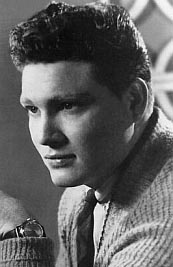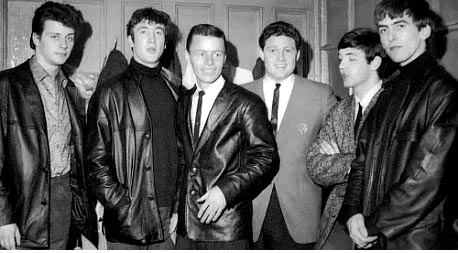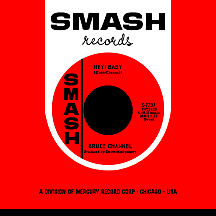BRUCE CHANNEL
Hey! Baby
Several West Texas singers were at the heart of the rock and roll explosion of the mid- to late-1950s. Roy Orbison of Wink, a small town just south of the lower border-corner of New Mexico, emerged with "Ooby Dooby" in '56. Buddy Knox hailed from Happy, up in the state's panhandle near Amarillo, and topped the charts in '57 with "Party Doll." Buddy Holly, geographically positioned between the two in the larger city of Lubbock, got hot around the same time with his band The Crickets. Jacksonville-born Wendell Bruce McMeans, in awe of these and many other Lone Star rockers, had already taken steps towards forging a music career by the time he graduated from High School in 1958. His path to success took longer than those nearby heroes, but the payoff came a few years down the line with the number one hit "Hey! Baby."
While growing up in the small town of Grapevine (near Fort Worth, about 150 miles northwest of Jacksonville), his family, most of whom were musicians, offered plenty of encouragement. Choosing Bruce Channel as a professional name (pronouced "chanel" as in Coco Chanel, it was actually his mom's maiden name), he won a local talent competition in 1955 (at age 14) that led to an appearance on The Big D Jamboree, broadcast on WRLD radio 1080 in Dallas. The following year he put a band together with a few high school friends, playing at parties, events and later in some small taverns where they were allowed to do their act but not drink. During senior year in '58, he successfully auditioned for The Louisiana Hayride, a weekly syndicated TV series broadcast from Shreveport, Louisana (where Elvis had received his first video exposure and many country music careers were launched); every Saturday morning for six months he took a train from Dallas, traveling nearly four hours each way to perform on the show, getting paid just enough to break even on expenses.
In the spring of 1959 Bruce wrote and recorded his first single, "Run, Romance, Run," a Presleyish midtempo teen rocker, with producer Marvin Montgomery for the Dallas-based Teen Ager label. He began collaborating with Margaret Cobb, a songwriter more than ten years his senior who lived in the nearby town of Irving; together they penned four sides he laid down for King Records in late '59 and early '60, including a sad ballad, "Will I Ever Love Again," and a hot two-sider, "Now or Never," backed with a "rock appreciation" tune, "Boy! This Stuff Kills Me." Right around the same time, Margaret and Bruce composed "Hey! Baby," a simple, flirtatious song ('C'mon, baby, give me a whirl...I wanna know if you'll be my girl!") that was catchy enough to spark interest from former Air Force officer Major Bill Smith of Dallas (coming off "Peanuts" by Rick and the Keens, a minor hit he'd produced a few months earlier), whose immediate reaction was to get him into the city's legendary Clifford Herring studio with The Straitjackets, a local group led by Lubbock native and Holly homeboy Delbert McClinton.

Bruce really felt his and Margaret's ballad "Dream Baby," written with The Platters in mind, was the better bet, but he was outvoted by everyone around him (it became the single's B side). As it turned out, Delbert (he and Bruce had coincidentally entered the world a few weeks apart in November 1940) supplied a great harmonica backing (that kicks in right at the beginning) and it made "Hey! Baby" stand out, an infectious hook that triggered Delbert's career as well as Bruce's. Major Bill released the single on his Le Cam label in November '61; the following month it made the top ten at KLIF 1190 in Dallas, then reached number one at Houston's 610 KILT the following month. Smith leased the rights to Mercury Records and the Smash label single was heard nearly everywhere in North America, hitting Billboard's number one spot for three weeks in March 1962.
In May, Bruce hit the road for his first large-scale tour, the only white artist on a bill headed by Fats Domino with Brook Benton, Gene Chandler, The Impressions and other R&B singers. Follow-up effort "Number One Man," another Channel-Cobb tune (with additional credit to Marvin Montgomery), already available on Le Cam and given national distribution on Smash shortly afterwards, came off as a similar-sounding sequel and stalled mid-chart at the same time. "Come on Baby" took a hotter, bluesier approach; a fever-pitch effort in comparison to the relatively carefree "Hey! Baby," the best it could muster was a brief listing near the bottom of the Hot 100. Delbert even had a single on Le Cam ("That Cat") as Mac Clinton and Straitjackets, released nationally on United Artists a couple of months later as, simply, the Straitjackets. Another 45, a Johnny Horton-style historical tune titled "Dunkirk" on the U.S. London label, appeared that summer under the name Del McClinton.
The following month, Bruce and Delbert (but none of the band's other members due to budget restrictions) toured the U.K., where "Hey! Baby" had been a number two hit. They were co-credited headliners; a dozen artists shared the bill including Frank Ifield and Johnny Kidd and the Pirates. One stop at the Tower Ballroom in New Brighton, Wallasey (just across the River Mersey from Liverpool) made a now-historic addition: The Beatles (John, Paul, George and drummer Pete Best) were added to the bill per an arrangement made by their manager, Brian Epstein (this was two months before the arrival of Ringo...and nearly three months before the release of their first Parlophone single). Lennon, in particular, was quite taken with McClinton's harmonica style, asking in a fanboyish way if Delbert would teach him a few tricks (mainly his harp technique on "Hey! Baby") and the licks John learned can be heard in several subsequent Beatles songs. Later, Bruce and Delbert realized they had met the greatest rock band of all time (or three of its original members, at least).

Four more Smash singles were issued before Channel got his Mercury-Smash walking papers. A Le Cam release, the cajun-influenced "Going Back to Louisiana," appeared on Billboard's chart in early 1964 despite the lack of involvement with a major record company. Over the next few years he made records for several small labels (Shalimar, Shah, Jade, Brownfield) including Mel-o-dy, a Motown subsidiary. Meanwhile, Delbert's group had changed its name to The Ron-Dels and reached the charts in July '65 with "If You Really Want Me To, I'll Go," a Major Bill production on the Smash label.
Signing with Mala Records in 1967, Channel began working with rocker Dale Hawkins, who'd switched gears and gone into music production. "Mr. Bus Driver," penned by Wayne Carson Thompson (who composed several of The Box Tops' biggest singles in addition to many country hits), updated Bruce's sound to fit in with the psych-pop trend, gaining the most radio airplay of any single since his one major hit; it spent a couple of weeks on the charts in December. Another Hawkins-Thompson effort, "Keep On," reached the U.K. top 20 in August and September of '68, leading to more touring in the British isles; in 1970 he met a young woman who worked for a U.K. booking agency and she became his wife - and lifelong companion - the following year.
Bruce continued recording for small regional record labels including Le Cam. In 1978 he moved to Nashville and had a one-shot release on Elektra Records, "One More Last Chance." The 1980s reaped dividends for him as a songwriter; country singers T.G. Sheppard, Janie Fricke, Anne Murray, John Conlee, Mel McDaniel and Brooks and Dunn all had major hits with songs he'd written. Delbert McClinton has remained active throughout the years, with Glen Clark as part of the duo Delbert and Glen in 1972 ("I Received a Letter"), a top ten solo smash in 1980 ("Giving it Up for Your Love") and a series of albums (30 years' worth!) that walk a fine line between country and blues. As for Major Bill Smith, he discovered two more hitmakers in the '60s (Paul and Paula and J. Frank Wilson and the Cavaliers) and kept the hustle going, with less success, until his death in 1994. Bruce Channel remains indebted to him for "Hey! Baby." But Major Bill rubbed some people the wrong way. Bruce liked him. Delbert...not so much.


